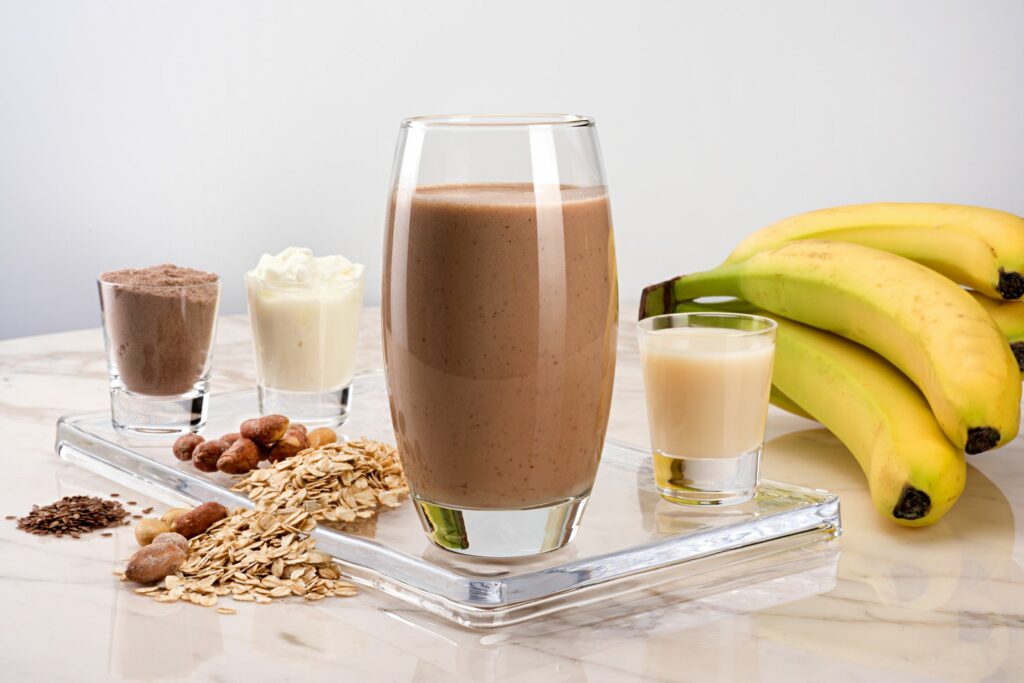Introduction:
Protein shakes have gained significant popularity in the fitness and wellness industry as a convenient and efficient way to increase protein intake. Whether you’re looking to build muscle or lose weight, protein shakes are often marketed as an effective tool to support these goals. In this comprehensive guide, we will explore the effectiveness of protein shakes for muscle gain and weight loss, providing you with an evidence-based analysis of their benefits, considerations, and potential limitations.
Protein Shakes for Muscle Gain:
Protein is an essential macronutrient that plays a crucial role in muscle repair, growth, and maintenance. Consuming an adequate amount of protein is particularly important for individuals involved in resistance training or those looking to build muscle mass. Protein shakes can be a convenient way to supplement protein intake, especially for those who may struggle to meet their protein requirements through whole foods alone.
Protein shakes typically contain a concentrated amount of protein, usually derived from sources such as whey, casein, soy, or plant-based proteins. These shakes can provide a quick and easily digestible source of amino acids, the building blocks of protein. Studies have shown that consuming protein shortly before or after exercise can enhance muscle protein synthesis, leading to better muscle recovery and adaptation.
Protein shakes can also be beneficial for individuals who find it challenging to consume sufficient protein through whole foods due to dietary restrictions, time constraints, or reduced appetite. However, it’s important to note that protein shakes should not replace a balanced diet rich in whole, nutrient-dense foods.
Protein Shakes for Weight Loss:
Protein shakes have also been touted as a potential tool for weight loss. High-protein diets are known to promote satiety, increase thermogenesis, and support the preservation of lean muscle mass, which can aid in weight management. Protein shakes can provide a convenient and low-calorie option to help control hunger and reduce overall calorie intake.
Replacing a higher-calorie meal or snack with a protein shake can create a calorie deficit, which is necessary for weight loss. Protein shakes can also help curb cravings and provide a sense of fullness, reducing the likelihood of overeating or reaching for unhealthy snack options.
However, it’s essential to choose protein shakes that are low in added sugars and other unnecessary additives. Reading labels and selecting shakes with a good balance of protein, fiber, and essential nutrients is crucial for optimal weight loss support.
Considerations and Limitations:
While protein shakes can be a valuable addition to a balanced diet and fitness routine, it’s important to consider some limitations and potential drawbacks. First, protein shakes should be viewed as a supplement rather than a replacement for whole foods. Whole, nutrient-dense foods offer a wide range of vitamins, minerals, and phytochemicals that are essential for overall health and well-being.
Furthermore, individual needs may vary when it comes to protein intake. Factors such as age, sex, activity level, and overall health should be taken into account when determining protein requirements. Consulting with a healthcare professional or registered dietitian can help you determine the appropriate amount of protein for your specific needs.
It’s also worth noting that excessive protein intake may not necessarily translate into greater muscle gains or weight loss. The body can only effectively utilize a certain amount of protein at a given time, and consuming excessive amounts may place unnecessary strain on the kidneys or lead to other health concerns.
Additionally, relying solely on protein shakes for nutrition may result in a deficiency in other essential nutrients, such as fiber, vitamins, and minerals. It’s important to maintain a varied and balanced diet that includes a wide range of whole foods to ensure optimal nutrient intake.
Conclusion:
Protein shakes can be an effective tool for muscle gain and weight loss when used in conjunction with a balanced diet and exercise routine. They can provide a convenient and easily digestible source of protein, helping to meet increased protein needs for muscle repair and growth. Additionally, protein shakes can support weight loss efforts by promoting satiety, reducing calorie intake, and preserving lean muscle mass.
However, it’s important to view protein shakes as a supplement and not a substitute for whole, nutrient-dense foods. A well-rounded diet that includes a variety of whole foods is essential for optimal health and nutrient intake. It’s also crucial to consider individual needs and consult with a healthcare professional or registered dietitian to determine the appropriate protein intake for your specific goals and circumstances.
Ultimately, protein shakes can be a valuable tool in achieving your muscle gain or weight loss goals, but they should be used in conjunction with a comprehensive approach to nutrition and exercise.

